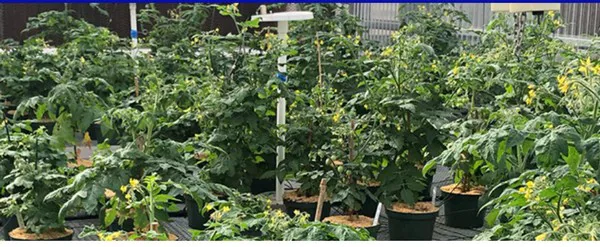COVID-19 led many people to start gardening, and it’s no passing fancy. However, growing in the outdoor garden is one thing. Tending to plants indoors at home presents other challenges and opportunities.
As they recognized the increasing popularity of growing indoors, University of Florida scientists Celina Gómez and Paul Fisher, UF/IFAS faculty members in environmental horticulture, co-hosted a virtual webinar recently. There, they introduced new plant varieties and how home gardeners can grow them indoors.
Their program focuses on developing and producing edible plants for gardening. Home growers can eat these crops, but the plants likely won’t produce enough fruits or vegetables for an entire family, said Gómez, a UF/IFAS assistant professor.
Ornamental and edible
“I think of them as both ornamental and edible crops, as they are typically grown for the pleasure of growing a plant — like most ornamentals — with the added benefit that they will produce a fruit or vegetable to be harvested and consumed, like most edible crops,” Gómez said.
Several factors have driven the increase in home gardening: Food insecurity and the pandemic are two of them.
“People are gardening in part to make sure that there is enough food on the table during times of so much uncertainty,” Gómez said. “Mental and physical well-being are also important drivers of the ‘pandemic gardening’ movement, as people seem to experience positive health benefits when gardening indoors and outdoors. During lockdown, people had more time to spend at home and many turned to gardening to keep themselves occupied.”

Hydroponics
Many people who want to start growing fruits and vegetables indoors at home turn to social media. So, Gómez conducted research recently that shows about half of the people who used the platform Reddit received misinformation about how to grow hydroponic plants indoors. She and her team looked at Reddit because those who use the platform and it’s “subreddits,” topic- or community-focused discussions, are hobbyists, most with no formal training in horticulture.
“A lot of the advice given to consumers via Reddit is based on experiences that may not be enough to educate someone on how to grow plants hydroponically,” she said. “Another big reason is that because indoor gardening is a relatively new horticultural trend, there is not a lot of easy-to-understand information available to consumers.”
To truly educate home indoor gardeners, UF/IFAS researchers will continue to give seminars and webinars, upload YouTube videos and provide research-based recommendations to help consumers interested in learning more about home gardening. Here is a link to their recorded presentations from a recent field day.
“We can also use social media platforms like Reddit to connect with consumers, in subreddits like AMA (“Ask Me Anything”), where it is not uncommon for scientists to connect with Reddit users to answer questions within a pre-defined window of time,” Gómez said. “We are writing updated UF/IFAS Extension documents about these new, growing gardening trends, which can also be helpful.”
For now, Gómez and Fisher, a UF/IFAS professor, will continue to test new cultivars for vegetables that are compact. That is, they’re bred for urban agriculture.
“We will also expand our research in hydroponics and indoor gardening to evaluate different light qualities and quantities that can help maximize yield and quality of fruiting vegetables,” she said. “Our hope is to host another field day in 2022 and make this an annual event.”
For more information:
University of Florida Institute of Food and Agricultural Sciences
www.ifas.ufl.edu
